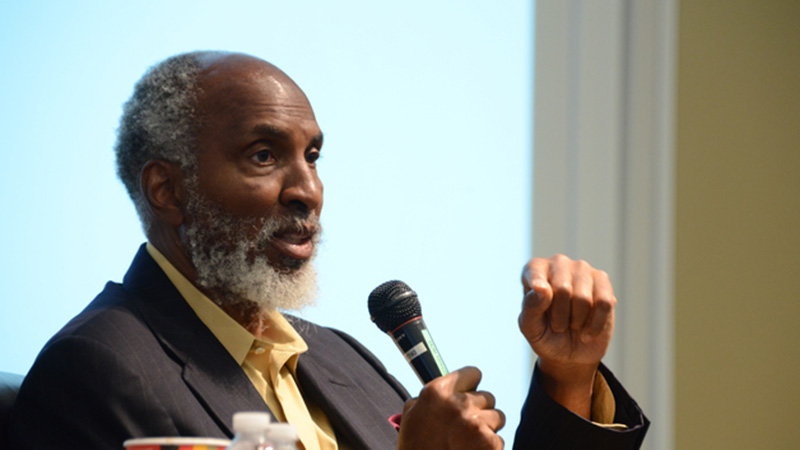The One Conversation We Can’t Afford to Avoid
Leer en español
john a. powell’s September 2015 Health Equity Learning Series presentation sparked a renewed awareness about racism among many grantees. Photo by David Cornwell
By Nancy Baughman Csuti
When did Coloradans start to become aware?
Was it with the killing of Michael Brown in Ferguson, Missouri? Or Freddie Gray in Baltimore? Was it two years earlier, when “white power” signs sprouted up in the predominantly Latino neighborhood of North Denver? Or the recent video full of racial slurs from Grand Junction that went viral?
For some, perhaps awareness came with a personal experience. Was it arriving at work to find out a friend and coworker had been deported the night before, leaving his American-born children without a father? Was it while standing in line at a restaurant and witnessing the staff ignore the black couple in the front of the line?
For others, perhaps awareness came at an early age—starting in first grade, being warned by parents to behave, and not act like white children for fear of the teacher’s wrath. Or was it listening to how the nurse spoke slowly and loudly to your mother as if she did not speak English?
Racism, discrimination and prejudice surround us whether we choose to be aware or not—and increasingly, awareness appears to be growing in Colorado. As the Health Equity Learning Series (HELS) continues to address social determinants of health and their role in health equity, racism can’t be ignored. Following the final 2015 HELS lecture, with Berkeley Professor john a. powell, Trust grantees hosting event-viewing parties around the state collectively recognized the need to put racism front-and-center in the equity conversation.
Yet 69 percent of Colorado’s population is non-Hispanic white. Some communities are close to 100 percent white. Surely there can’t be cases of racism and discrimination when so many of us are white… can there? And even if racism does exist, is this something that we as Coloradans want to acknowledge and discuss?
As a result of their feedback, HELS grantees were interviewed by Melanie Tran, MHPA of the University of Colorado Denver to better understand their thoughts on community readiness to discuss racism as a social determinant of health. The findings, available online here, show that while not everyone is comfortable having these conversations, recognition of the importance of them to achieving health equity is strong across the state. Grantees shared their perspectives with us on how to raise awareness and begin community conversations about racism and health equity.
Hardly a day goes by when the news doesn’t detail yet another example of racism in our country. Awareness of this persistent social determinant of health is a critical step to overcoming it. The Health Equity Learning Series provides expert insights into what it takes to achieve health equity.
The 2016-17 HELS begins on Sept 16 with a presentation by Deliana Garcia, MA of the Migrant Clinicians Network, and a conversation with her afterward. Be it at this HELS event or a future one, tough but important conversations about race are bound to continue, and to be needed. When it comes to talking about racism, one of the HELS grantees from last year said it best: “It’s been a difficult conversation to have, and we’ve avoided it. We have to address it, so let’s be brave and jump in.”